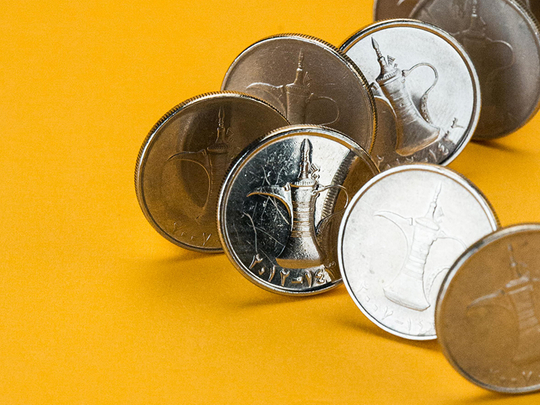
The daily routine of shelling out Dh1.50 for a cup of karak tea, post VAT, now asks of you to part with 5 per cent more and that’s alright. But what is perplexing to residents is the matter of how to get back the exact small change. For example, the 10 fils you pay as VAT for the karak tea means your total bill is Dh.1.60. You are owed a change of 10 fils if you pay Dh2 but the change does not end up in your pocket as it gets absorbed into a rounded-off bill. Multiply this sum for the number of teas you will have in a month or even a year and you will see how significant the sum is. And then multiply the sums for every single small item you purchase through the year.
The issue of small change that gets absorbed into even, rounded off to the nearest whole number is not new. With the absence of fils denominations in smaller numbers such as 5, 10 or 20, the parting of ways with small change is a concern for many residents.
Gulf News asks residents whether sweat or not about the small change.
Lujyne Amro, 19, Jordanian student, said that she purchased some vegetables, potatoes to be precise, and it cost her Dh2 and 15 fils with VAT. But she ended up paying Dh2.25 as there was no way to get back the 10 fils.
“It depends on the cashier,” said Amro. “Sometimes, they forgo the small sums but at other times, they take more than what is due and do not return the change.”
Amro does grocery purchases once a week, and just on a bag of potatoes alone, she would end up paying Dh5.60 extra per year.
Samar Mouazen, 18, Lebanese, said that she pays Dh8.00 for a croissant that costs Dh7.90. “I buy a croissant every morning before I head to my university, which means that I have to pay an extra 10 fils every day.”
Mouazen would have to pay an extra Dh3.00 every month on croissants due to the many 10 fils that she doesn’t get back, and annually, her daily croissant routine would cost her Dh36 extra.
For Sana Hammouda, Palestinian housewife, buying beef cubes cost her Dh30.80, leading to her pay Dh31.00, and not getting her change back.
“My total receipt on that day was Dh 81.65, I gave him Dh100 and got back Dh18.25, which means I didn’t get back 10 fils,” Hammouda said.
Hammouda purchases beef twice a week and she reckons she ends up paying an extra Dh22.40 on her beef shopping alone.
For Dina Chan, 26, paying Dh14.00 for her 2 cups of coffee that she drinks per day, along with VAT, pushes up her bill to Dh14.70, obliging her to pay Dh15.00 since she can’t get a change back.
“I used to spend Dh6.00 on my breakfast, but now it costs me Dh6.30, and I would pay Dh6.50, because 30 fils doesn’t exist, and I can’t get my change back,” said Dina.
This means, at a cost of an extra Dh9.00 every month, it would cost her an extra Dh108.00 every year.
As for Jaaved Khatree, audience editor, a friend of his had a similar problem when he bought “Chai Karak”. “He usually buys Chai for Dh 1, but now it costs Dh 1.05, meaning that he would have to pay Dh 1.50 and not get his change back.”
Khatree also stressed on the similar experiences that people are sharing on different social media platforms. They are posting pictures of their receipts to try to get a clarification on how to deal with the issue of small change.
Falak kassab is an intern with Gulf News








